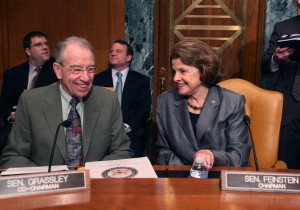
U.S. Sen. Dianne Feinstein (D-CA) (R) and U.S. Sen. Chuck Grassley (R-IA) talk during Senate Caucus on International Narcotics Control hearing on Capitol Hill (Photo by Mark Wilson/Getty Images)
Over the past few months, from local community halls to Capitol Hill, one thing has been made clear: there is an outcry of support in favor of more research on CBD and medical marijuana. Proponents of CBD oil state that removing these barriers to research is the only clear way to market something so significant to families around the world.
Earlier this year, Democrat Sen. Diane Feinstein (CA) and Republican Sen. Charles Grassley (IA) urged the Obama administration to “definitively determine if CBD has scientific and medical benefits,” and to “look at expanding compassionate access programs where possible, to benefit as many children as possible.”
Recently, support has also come out from the director of the US National Institute on Drug Abuse (NIDA), Nora Volkow. Volkow believes that cannabidiol (CBD) – a nonpsychotropic cannabinoid – is “a safe drug with no addictive effects.” In a column with The Huffington Post, she further stated that“[P]reliminary data suggest that it may have therapeutic value for a number of medical conditions.”
With all of the talk going on around the country, is there any action behind these promises? This past Friday, The New York State Department of Health selected five companies, evaluated based on scored criteria, that will receive licenses to grow medical marijuana under the Compassionate Care Act. New York’s medical marijuana program is due to be operational this January.
Each company has been selected to grow and manufacture cannabis in one location and distribute the medicine to four dispensaries scattered around the state. The selected companies are:
• Bloomfield Industries Inc., which will grow marijuana in Queens and dispense it Nassau, New York, Onondaga, and Erie
• Columbia Care NY LLC, which will grow and operate a dispensary in Monroe, as well as dispense in New York, Suffolk, and Clinton
• Empire State Health Solutions, which will grow in Fulton and dispense in Broome, Albany, Westchester, and Queens
• Etain LLC, which will grow in Warren and dispense in Albany, Ulster, Westchester, and Onondaga
• PharmaCann LLC, which will grow in Orange and manufacture in Erie, Onondaga, Albany, and the Bronx
“The five organizations selected for registration today showed, through a rigorous and comprehensive evaluation process, they are best suited to produce and provide quality medical marijuana to eligible New Yorkers in need, and to comply with New York’s strict program requirements,” said Dr. Howard Zucker, New York State health commissioner.
There will be five growers and twenty dispensaries throughout New York’s 55,000 square miles.
With significant progress permeating throughout the country, Politico helped summarize how far this fight has come. It was just over a year ago that any marijuana reform sent to Washington was shot down without much consideration. “For decades, it appeared that DEA had no better friend than Congress, a body that blindly believed everything DEA told it about the dangers of weed. In 1998, the first time Congress voted on medical marijuana, it was an anti-medical marijuana House resolution co-sponsored by nine Republicans (including Rob Portman and Dennis Hastert), which passed 311-94.”
In 2003, a measure that prevents the federal government from interfering with state-legal medical marijuana programs was introduced. This was one of the first pro-marijuana resolutions to actually receive a vote. “In 2014, after eight tries, that measure, known as Rohrabacher-Farr, finally passed by a vote of 219-189 as an amendment to a larger appropriations bill. Today, though, nearly all of the momentum now appears to be on the side of legalization. On June 3, 2015, Rohrabacher-Farr was renewed with a vote of 242-186.” Progress may be slow but it is becoming increasingly apparent that the tide has officially turned.
